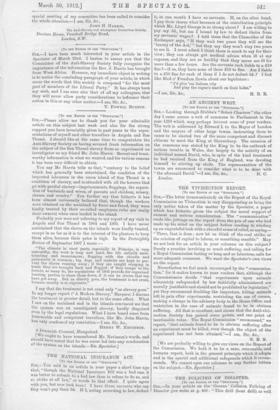[To THE EDITOR OF TIIE "SPECTAT011.1 SIR,—Please allow me to
thank you for your admirable article on this subject last week and also for the strong support you have invariably given in past years to the repre- sentations of myself and other travellers in Angola and San Thome. I should like at the same time to congratulate the Anti-Slavery Society on having secured fresh information on the subject of the San Thome slavery from so experienced an investigator as my friend Mr. John Harris. Recent and trust- worthy information is what we wanted, and for various reasons it has been very difficult to obtain.
You say Mr. Harris tells us that, "-contrary to the belief which has generally been entertained, the condition of the imported labourers in the cocoa island of San Thome is a condition of slavery, and is attended with all the horrors that go with predial slavery—imprisonments, floggings, the separa- tion of husbands and wives, of parents and children, misery, shame, and cruelty." You further say that hitherto it has been almost universally believed that, though the workers were obtained on the mainland by force•and fraud, they were kindly treated by their so-called employers (who are really their owners) when once landed in the island.
Probably you were not referring to my report of my visit to Angola and San Thom6 in 1904 and 1905. I have never maintained that the slaves on the islands were kindly treated, except in so far as it is to the interest of the planters to keep them alive, because their price is high. In the Fortnightly Review of September 1907 I wrote :— "The climate in most parts, especially in Principe, is very unhealthy, the work is long and hard, the life entirely unin- teresting and monotonous; flogging with the chicotts and palmatoria is common ; big dogs and sentries are kept to pre- vent the slaves running away ; if they are caught escaping in boats they are brought back and flogged; if they escape to the forests, as many do, the regulations of 1903 provide for organized hunting parties to chase them down, if it can be shown that ten have got away. But as slavery goes, the treatment is not cruel, because cruelty is so expensive."
I say that the treatment is not cruel only "as slavery goes." In my longer report ("A Modern Slavery," Harpers) I discuss the treatment in greater detail, but to the same effect. What I saw on the mainland and in the islands convinced me that the system was an unmitigated slavery, hardly disguised even by the legal regulations. What I have heard since from honourable and competent travellers, like Mr. John Harris, has only confirmed my conviction.—I am, Sir, Sm., HENRY W. NEVINSON.
4 Downside Crescent, Hampstead. [We ought to have remembered Mr. Nevinson's words, and should have noted that he was never led into any condonation of the system on the islands.—En. Spectator.]






































 Previous page
Previous page